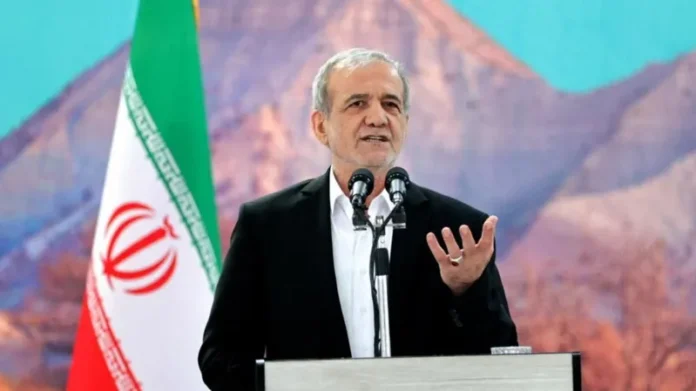Tehran — Iranian President Masoud Pezeshkian was reportedly slightly injured in a covert Israeli airstrike on a secret underground facility in Tehran last month, according to a report published by Iran’s state-affiliated Fars news agency.
The incident, which allegedly occurred on June 16, took place during the fourth day of the 12-day war between Israel and Iran. According to Fars, six bombs were used to target access and exit points of a concealed bunker in north-western Tehran, where Pezeshkian and other top officials of the Supreme National Security Council were holding an emergency session.
The report claims that Pezeshkian sustained leg injuries while escaping the facility through an emergency shaft. While the president was ultimately able to reach safety, the strike is said to have temporarily trapped Iran’s top leadership, cutting off ventilation systems and electricity inside the facility.
Fars suggested the attack may have been aided by Israeli agents operating within Iran, a claim now reportedly under investigation by Iranian intelligence services.
Videos widely circulated on social media during the conflict had already hinted at intense Israeli strikes on a mountainside in the same area. Only now has it emerged that one of the targets was a high-security military installation housing senior decision-makers.
The Supreme National Security Council, chaired by the president but ultimately overseen by Supreme Leader Ayatollah Ali Khamenei, plays a central role in Iran’s strategic and military planning.
In remarks made last week, Pezeshkian publicly accused Israel of attempting to assassinate him. However, Israeli Defence Minister Israel Katz dismissed the accusation, insisting that “regime change” in Iran was not an objective of Israel’s military campaign.
At the start of the war, Israel successfully eliminated several top commanders from Iran’s Islamic Revolutionary Guard Corps (IRGC) and regular army. Iranian leaders have since admitted they were caught off guard, with a notable lack of coordination during the war’s initial phase.
Israel has neither confirmed nor denied the Fars report, which remains unverified by independent sources. However, senior Israeli officials have acknowledged that Supreme Leader Khamenei was a key target early in the war, although they lost track of him after he was relocated to a heavily secured site.
On June 13, Israel launched a surprise offensive on Iranian nuclear and military infrastructure, citing threats from Tehran’s suspected weapons development programme. Iran continues to deny allegations that it is seeking to build nuclear weapons, maintaining that its uranium enrichment is for peaceful use.
The United States, which joined the conflict nine days later, carried out air and missile strikes on three of Iran’s nuclear facilities on June 22.
Former U.S. President Donald Trump described the action as having “obliterated” key sites, though U.S. intelligence agencies have expressed more measured assessments.

